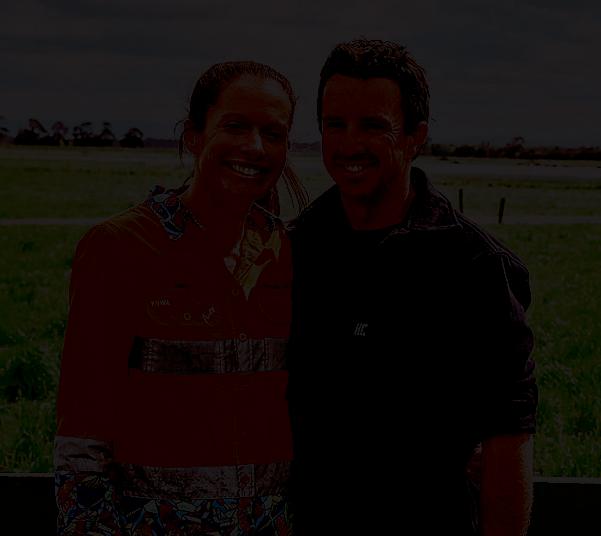
4 minute read
Business thriving for farming couple
Zoe ASKEW
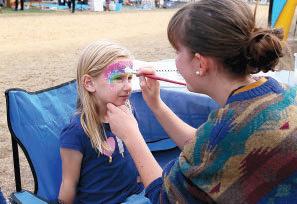
MAFFRA dairy farmersBradand Jenna White have profited greatly from Phase 1ofSouthern Rural Water’s Macalister IrrigationDistrict 2030 (MID2030) modernisation program, showcasing what manymorefarmerscan anticipateupon completion of the Newry pipeline.
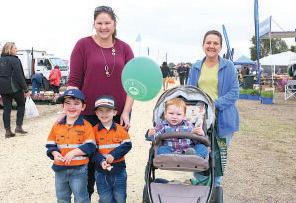
Brad White grew up in Gippsland, born into ageneration-longfarming family,dairy on oneside and wine on the other.Hestudied agriculture at Melbourne University, spending six years in Melbourne and Dookie beforereturning to Maffra, where he would meet Jenna.
Jenna grew up in Canberra; farming too, runs through her veins. Her father was raised in Sale, hailing from afarming background. Jennastudiedparamedics and nursing,obtaininga positionwith Rural Ambulance Victoria after graduating from university.
“I thenmet Brad,moved to Sale and became afarmer,” Jenna said.
“I still work as aparamedic and have done so for nearly 15 years.”
Brad and Jenna manage four properties, milking a480-head seasonal-calving,selfreplacing, Friesian-cross dairyherdand have invested significantly to improve water efficiency and increase production.
The Whites wereencouraged by Southern RuralWater’s $159.7millionMID2030 modernisation program to implement onfarmimprovements that enabled them to add 40 cows to their herdand buy an extra farm.
“Wewanted to expand and would have struggled to do so without the improved security around irrigation flows deliveredby the MID2030Stage 1B project,” Brad said.
Jenna said the increase in land and cow numbers, irrigation was becoming aburden on time and energy.
“Brad had to do all the irrigating himself, but it is amuch simpler task now, with better water efficiency,” she said.
“The upgrades have allowed us to better drought-proof the farm.

“Agricultureiscyclical. It might be raining now, but we could be in adrought next year,and the changes we’ve made will be worth it when times change.”
The Macalister Irrigation District is the largest irrigation district in southern Victoria, with securewater supplies augmented by goodrainfall,productive soils, astrong dairy sector and developing vegetable and croppingindustries, estimated at an economic contribution of morethan $500 million per year
SouthernRural Water identified that moreinvestment was required to allow farmers to implement best-practice water use, invest in on-farmefficiency, and boost agricultural output while becoming more climate resilient.
The MID2030 modernisation program was dividedintophases;Phase 1A was completed in 2017,and Phase 1B in 2020.
In 2020, as part of Stage1B, Southern Rural Water removed old Detheridge wheels, installed anew pipelineand upgraded and automated existing channels across the Riverslea section.
“These works gave us confidence to invest in pipeline works on our farm, install and automatethe associated pumps, build a holding dam, install apipe and riser system, and install centrepivots,” Brad said.
“Irrigating is now aless time-consuming and muchsimpler task,and we’ve been able to achieve much better water efficiency.
“Water is the lifeblood of this region, and its importanceasaresource cannotbe underestimated,” he said.
“Weconstantlyneedtobedoingmore with less, so wasting water through ageinginfrastructureisnot smart. The area will benefit hugely from the extra water available through modernisation and the incentives it gives progressive businesses like us to invest in on-farmefficiencies.”
Dairy FarmMonitor is ajoint Agriculture Victoria and Dairy Australia initiative that collects financialand physical data from dairy farms in Gippsland, South-West and NorthernVictoria.
Despite results from the 2021-22 Dairy FarmMonitor Projectrevealing farmers believed succession planning, input costs, milk pricesand climate change aremajor challenges affecting the sector,the Whites areoptimistic about the future.
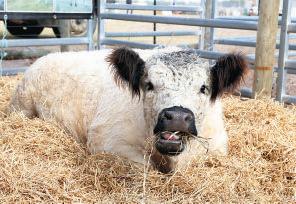
“I don’t think agriculturehas ever been without these things, it’s just part of the game,” Brad said.
“The biggest change for the industry is that farmers arenot just farmers anymore; they arebusiness managers who need to be skilled in HR, finance, technology, as well as all the basics needed to manage the farm.
“Theseskills and an in-depth understanding ofhow yourbusiness operates make managing the volatilities of theindustry far easier,allowing moreoptimism for the future.”
Jenna said for them, therehad never been abetter time to be in dairy farming.
“We’ve spent alot of time and effort building up and training agreat team and investing in systems and technology that helps us keep costs under control,” Jenna said.
Brad said he had yet to experienceabetter time than now in his farming career
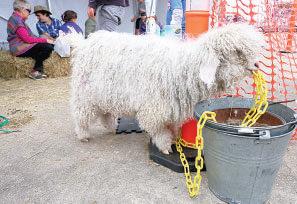
“I understandthe reasonspeople are leaving, but for us, it is agood placeto be,” he said.

“The business is in aposition now where we can haveacomfortable lifestylewith plenty of family time. Managing our team well and keeping costs under controlare our priorities now. These two things allow freedom within our business, allowing us time to get away from the farmand being financially secure.
“Welove the land; we love the space and freedom it provides us and our family,” Brad exclaimed.
“Dairy farming specifically is what Iknow and grew up with; thereare difficult aspects to it, but it provides asteady and secure incomewhichmakesplanning and budgeting easier.”
Accordingtothe 2021-22Victorian DFMPreport, participants received the fourth-highest financial returns recorded in the project’s 16 years.

AgricultureVictoria FarmBusiness Economist, Natalie Nelson, said the average profit in 2021–22 from the 80 participant farmbusinesses was 45 per cent above the long-termaverage.


“This strong performance was influenced by anine per cent increase in average milk price to $7.37 perkilogramofmilksolids,” she said.
“However,the increased milkprice coincided with higherinput costs and supply constraints, including labour,feed andfertiliser, whichimpactedthe overall 2021-22 farmbusiness margins.
“For dairy farms in the irrigation areas of the GoulburnMurray and Macalister Irrigation District, favourable seasonal conditions and lower irrigation costs assisted in strong performances,” Ms Nelson said.
Jaydo Construction Pty Ltd,Southern Rural Water’s construction partner, has begun work on the Newry pipeline component of the MID Phase 2Project in Gippsland.
The MID Phase 2project is replacing 100-year-old channels with new pipelines and automated outlets andwill deliver about 4300megalitresinwater savings and increase delivery efficiency to more than 90 per cent.
The project includesthe installation of the Newrypipeline, includingassociated outlet upgrades, reconnection works and decommissioning for Newry customers.
Transitioning to areliable piped supply means waterisnot lost from leakageor evaporation and increases environmental outcomes with areduction in farmrunoff into waterways.
This will drive vital investment in on-farm efficiencies, improve farmproductivity and supportlocal businesses to be moreclimate resilient.
SouthernRural Water managingdirector Cameron FitzGerald, was excited to start construction on the Newry Pipeline Project.
“This major infrastructureupgrade is awin for Gippsland and will markedly increase both water deliveryefficiency and customer service levels,” Mr FitzGerald said. Jenna said anyone anticipating modernisation should be “very excited”.
“If you’rewilling to make changes on your property, the gains to be made from it are huge,” she said.













